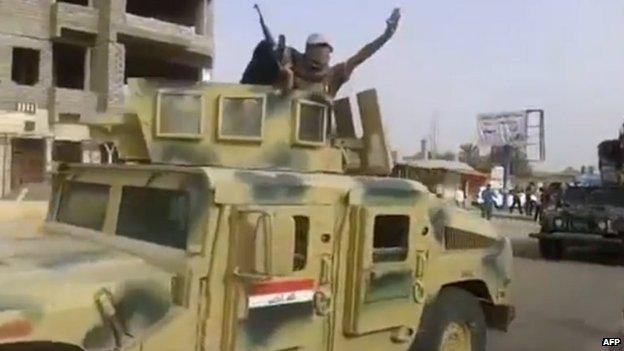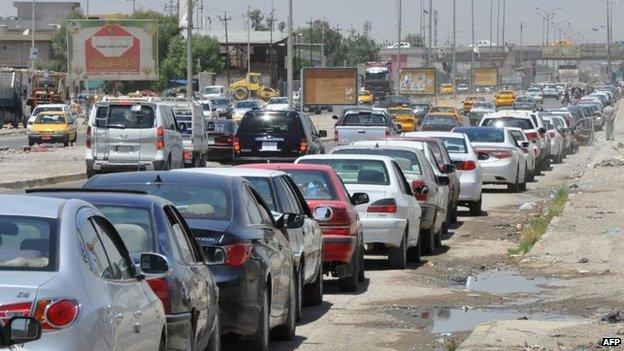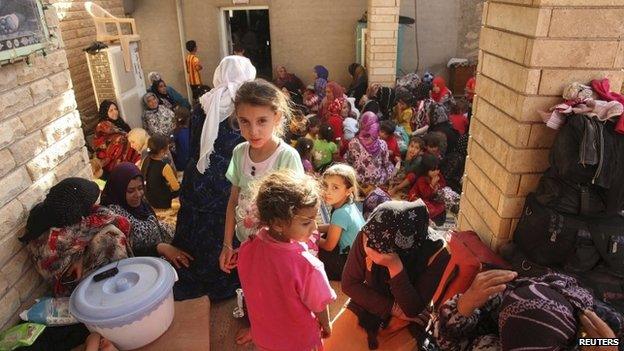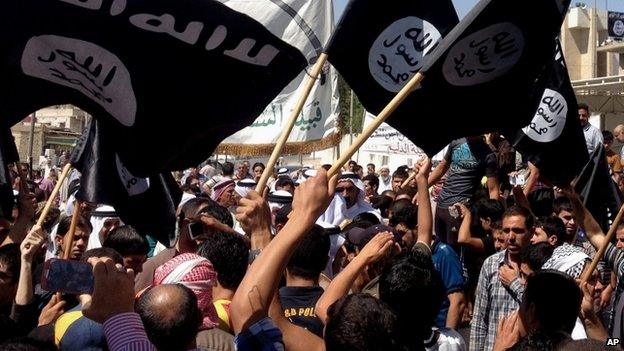Iraq crisis: Baiji oil refinery contested
- Published
Iraqi government forces are battling Sunni Muslim militants for control of the country's biggest oil refinery.
Officials insisted security forces were "in full control" of the Baiji refinery, about 200km (130 miles) north of the capital Baghdad.
But militants led by the jihadist Islamic State in Iraq and the Levant (ISIS) have surrounded the facility.
Iraq has asked for US air strikes on the militants. President Barack Obama is to make a statement shortly.
Unnamed US officials have been quoted as saying that the US will deploy 100 special forces troops to aid the Iraqi army's operation.
Earlier, a spokesman for the party of Iraqi Prime Minister Nouri Maliki told the BBC the country's leaders had felt "abandoned" by the international community as several northern cities and towns were seized by attacks by ISIS and its Sunni Arab allies.
Petrol queues
ISIS-led militants launched an assault on the Baiji refinery early on Wednesday.

On Thursday, the Iraqi military said some 100 assailants had been killed as troops and helicopter gunships repelled repeated attacks that continued overnight.
But witnesses said the militants had breached the perimeter and set fire to several storage tanks.
Video footage showed smoke billowing from the refinery and the black flag used by ISIS flying from a building.
Barack Obama is mulling over a rage of options - from airstrikes to training Iraqi forces, as the BBC's Nick Childs reports
Nearly all the 15,000 workers at the refinery and 100 foreign experts left on Tuesday when the plant was shut down in anticipation of the attack.
On Thursday morning, about 250 to 300 workers were evacuated under an agreement brokered by local tribal leaders, one of the workers told the Reuters news agency.
For several days, production has been halted at Baiji, which supplies much of the country's domestic fuel.
The shutdown has sparked panic buying in northern regions, with long queues at petrol stations in Iraqi Kurdistan, even thought there are not yet any real shortages, the BBC's Jim Muir reports from Irbil.

ISIS-led militants overran the town of Baiji last week, seizing abandoned military vehicles

The closure of Baiji has already had an impact on petrol supplies in northern Iraq

The UN Children's Fund said the situation facing the 400,000 displaced people in the north was "dire"
Hostilities have been reported elsewhere in the north and west of the country, including around the airport of the strategic town of Tal Afar.
Police told the BBC that ISIS-led militants had killed 13 police officers and Kurdish peshmerga militiamen while capturing the village of Bayshir, south of the strategically important northern city of Kirkuk, over the past two days.

Iraq's sectarian split

Members of Iraq's Shia majority community have volunteered to fight alongside the security forces
Sunnis and Shia share fundamental beliefs, but differ in doctrine, ritual, law, theology and religious organisation
The origins of the split lie in a dispute over who should have succeeded the Prophet Muhammad as leader of the Muslim community
Sunnis are the majority sect in the Muslim world, but Shia, most of them ethnic Arabs, form between 60% and 65% of Iraq's population; Sunnis make up 32-37%, split between Arabs and Kurds
Sunni Arabs dominated Iraq under Saddam Hussein and their persecution of the Shia stoked sectarian tensions; the US-led invasion in 2003 gave the Shia an opportunity to seek redress
Nouri Maliki has been accused of denying Sunni Arabs meaningful representation and pursuing security policies that target them

Shia militiamen have been sent to assist in the defence of the capital of Diyala province, which has effectively become a front line, and the nearby city of Samarra, site of a major Shia shrine.
State television quoted Mr Maliki as saying volunteers who went to fight in contested areas would be given 750,000 Iraqi dinars per month (£378; $644).
Mr Maliki has tried to assure Iraqis that the momentum is shifting, but the representative of Grand Ayatollah Ali al-Sistani, the most senior Shia cleric in Iraq, told the BBC that religious leaders sensed "a real danger which threatens Iraq and its unity".
Iraqis 'failed'
Iraq's military is awaiting President Obama's decision on air strikes.
On Wednesday, the chairman of the US Joint Chiefs of Staff, Gen Martin Dempsey, warned that the US military still lacked sufficient intelligence to take action. He told a congressional hearing that pilots would have difficulty knowing who they were attacking from the air.
Sheikh Abdul Mahdi Karbalai, spoke exclusively to the BBC's John Simpson: ''This danger could spread''
Gen Dempsey went on to say there was "very little that could have been done to overcome the degree to which the government of Iraq has failed its people. That is what has caused this problem".
ISIS has exploited deep resentment among Iraq's minority Sunni Arabs, who have long accused Mr Maliki of discriminating against them and monopolising power.
A spokesman for Mr Maliki's Dawa party, Zuhair al-Nahar, said the prime minister had met Sunni Arab and Kurdish leaders and that they had "come out in a united stand".
"My message from all the leaders in Iraq is that they feel abandoned, that they want America, Europe, the UN, to take immediate action to rectify the military situation," he told the BBC.

ISIS in Iraq

The rebels now control the northern cities of Mosul and Tikrit
ISIS grew out of an al-Qaeda-linked organisation in Iraq
Estimated 10,000 fighters in Iraq and Syria
Joined in its offensives by other Sunni militant groups, including Saddam-era officers and soldiers, and disaffected Sunni tribal fighters
Exploits standoff between Iraqi government and the minority Sunni Arab community, which complains that Shia Prime Minister Nouri Maliki is monopolising power
ISIS led by Abu Bakr al-Baghdadi, an obscure figure regarded as a battlefield commander and tactician